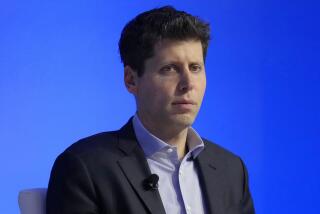AIG Chief Executive Said to Have Stepped Down
NEW YORK — Maurice R. Greenberg has stepped aside as chief executive of American International Group Inc. amid concern over a rising number of regulatory inquiries at the financial services titan he built over nearly four decades, the Financial Times reported Monday.
The Financial Times, which did not cite a source for the report on its website Monday night, said the board had named Martin Sullivan -- a co-chief operating officer and vice chairman -- as chief executive.
Greenberg, who formally retired, will remain as chairman of the company, reports said.
Greenberg’s departure as CEO would be the third such high-profile departure in recent weeks. The boards of Hewlett-Packard Co. and Boeing Co. have recently forced out CEOs.
AIG shares fell 86 cents, or 1.3%, to $63.85 on the New York Stock Exchange.
Analysts at UBS Investment Research, which rates the stock “Buy 1,” said in a research report that “the optimal scenario” would be if Greenberg relinquished the CEO post but remained chairman. It added that “the caliber of AIG’s executive bench is strong across all of its businesses,” suggesting that management could weather the shake-up.
Sullivan, named as Greenberg’s successor as CEO, joined AIG in 1971 in London, according to the company. He held a number of management positions before assuming the posts of co-chief operating officer and vice chairman in May 2002. At that time, he also was named one of seven members of the “office of the chairman.” Sullivan serves on AIG’s board.
AIG, headquartered in New York, is one of the world’s largest property-casualty insurers.
Greenberg joined AIG in 1960 and became president in 1967 when it was a seller of property-casualty insurance in the United States and had a major life insurance business in Asia. He assumed the chairmanship in 1989. It has grown into one of the world’s most powerful financial services companies with a market capitalization of $168.5 billion.
Last November, AIG agreed to pay $126 million to settle allegations of securities fraud by the Securities and Exchange Commission and the Justice Department related to three 2001 transactions it made with PNC Financial Services Group Inc. that allegedly helped the Pittsburgh-based banking company artificially inflate its earnings.
More to Read
Inside the business of entertainment
The Wide Shot brings you news, analysis and insights on everything from streaming wars to production — and what it all means for the future.
You may occasionally receive promotional content from the Los Angeles Times.










